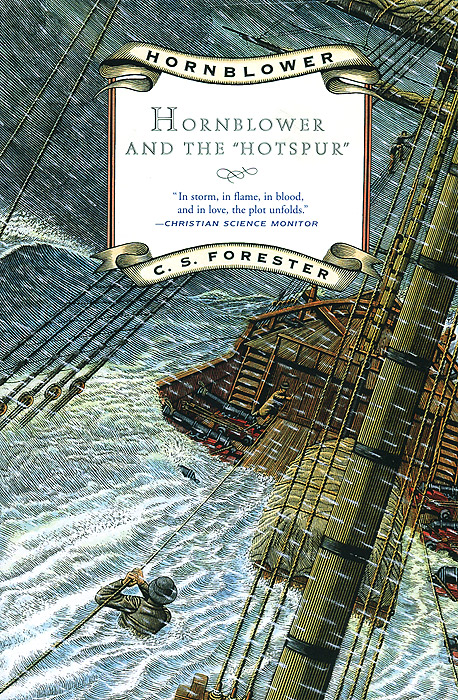Книга: C. S. Forester «Hornblower and the "Hotspuk"»

|
April 1803. The Peace of Amiens is breaking down. Napoleon is building ships and amassing an army just across the Channel. Horatio Hornblower - who, at age twenty-seven, has already distinguished himself as one of the most daring and resourceful officers in the Royal Navy-commands the three-masted Hotspur on a dangerous reconnaissance mission that evolves, as war breaks out, into a series of spectacular confrontations. All the while, the introspective young commander struggles to understand his new bride and mother-in-law, his officers and crew, and his own "accursed unhappy temperament"-matters that trouble him more, perhaps, than any of Bonaparte's cannonballs. Издательство: "Back Bay Books" (1998) Формат: 140x210, 400 стр.
ISBN: 978-0-316-29046-3 Купить за 759 руб на Озоне |
C. S. Forester
Infobox Writer
name=C. S. Forester
birthdate = Birth date|1899|8|27|mf=y
birthplace =
deathdate = death date|1966|4|2|mf=y
deathplace = Fullerton,
occupation = Novelist
nationality = flagicon|United Kingdom British
genre = Adventure,
debut_works =
Cecil Scott Forester was the
Biography
Born in
During
The
Forester wrote many other novels, among them "The African Queen" (1935) and "The General" (1936);
He wrote several volumes of short stories set during the Second World War. Those in "The Nightmare" (1954) were based around events in Nazi Germany, ending at the
His non-fiction seafaring works include "The Age of Fighting Sail" (1956), an unusually candid account of the Sea battles between Great Britain and the United States in the War of 1812.
In addition to his novels of seafaring life, Forester also published two crime novels, "
References
* John Forester: "Novelist & Storyteller. The Life of C. S. Forester", ISBN 0-940558-04-1 ( [http://www.csforester.org/info.asp excerpt] ).
External links
* [http://www.kirjasto.sci.fi/forester.htm Biography and Selected Works]
* [http://mwilden.com/forester/bibliography.htm Bibliography]
* [http://www.csforester.eu C.S. Forester Society]
*imdb name|id=0286163|name=C.S. Forester
Источник: C. S. Forester
Другие книги схожей тематики:
| Автор | Книга | Описание | Год | Цена | Тип книги |
|---|---|---|---|---|---|
| C. S. Forester | Hornblower and the "Hotspuk" | April 1803. The Peace of Amiens is breaking down. Napoleon is building ships and amassing an army just across the Channel. Horatio Hornblower - who, at age twenty-seven, has already distinguished… — Back Bay Books, (формат: 140x210, 400 стр.) Подробнее... | 1998 | 759 | бумажная книга |
См. также в других словарях:
Forester — ist der Familienname folgender Personen: Cecil Scott Forester (1899–1966), englischer Schriftsteller und Journalist John B. Forester († 1845), US amerikanischer Politiker Nicole Forester (* 1972), US amerikanische Schauspielerin Forester… … Deutsch Wikipedia
Forester Pass — Altitude 4 009 m Massif Sierra Nevada … Wikipédia en Français
Forester — For est*er, n. [F. forestier, LL. forestarius.] 1. One who has charge of the growing timber on an estate; an officer appointed to watch a forest and preserve the game. [1913 Webster] 2. An inhabitant of a forest. Wordsworth. [1913 Webster] 3. A… … The Collaborative International Dictionary of English
Forester — [ fɔrɪstə], C. S. (Cecil Scott), englischer Schriftsteller, * Kairo 27. 8. 1899, ✝ Fullerton (Calif.) 2. 4. 1966; schrieb spannende Soldaten , Marine und Abenteuerromane, humorvolle Reisebeschreibungen und eine Nelson Biographie (1944; deutsch) … Universal-Lexikon
Forester — Forester, C.S. (1899 1966) a British writer best known for his stories about the Royal Navy during the Napoleonic Wars, especially those about the character Captain Horatio Hornblower … Dictionary of contemporary English
forester — (n.) late 13c. (late 12c. as a surname), from O.Fr. forestier forest ranger, forest dweller (also, as an adjective, wild, rough, coarse, unsociable ), from forest (see FOREST (Cf. forest) (n.)) … Etymology dictionary
